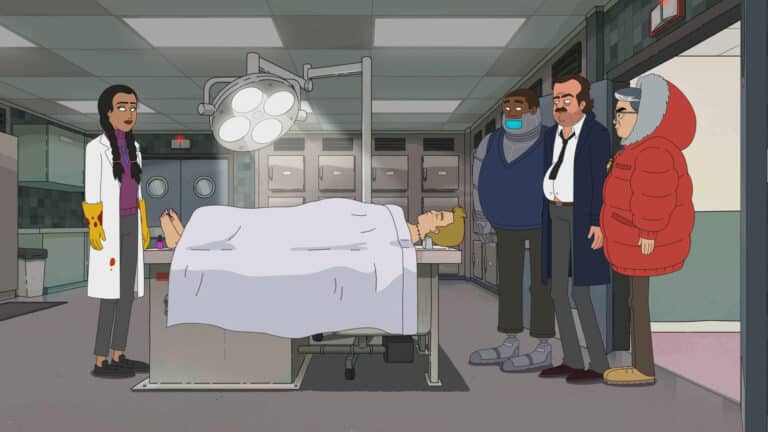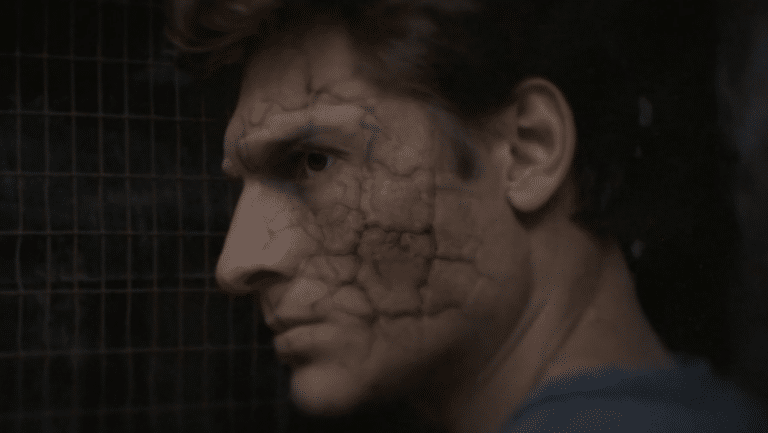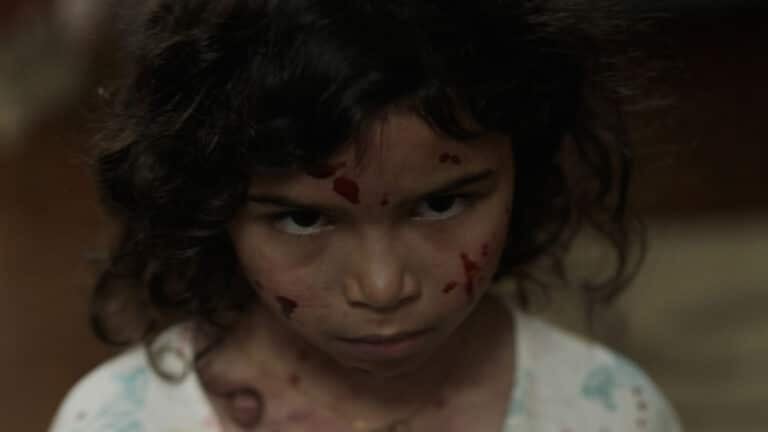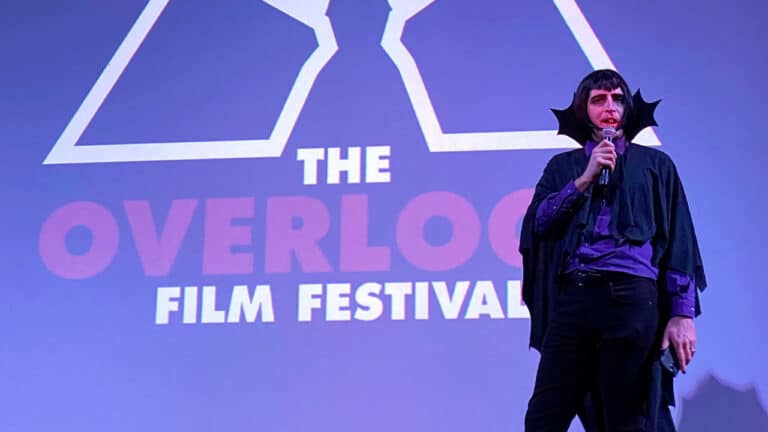
Horror films seem to suffer expiration dates in greater numbers than most other genres. Beloved films to which we give a pass because they excel in one area or another are routinely re-examined and found wanting when it comes to the treatment of basically any marginalized group outside of heterosexual cisgender white men. Race, gender, class, sexuality, religion, politics – the horror genre has a mixed record dealing with social issues, and we’re now at the point where, if the infraction is egregious enough, and the public wills it so, those films will go away.
But sometimes what is first thought a flaw is actually a feature, or maybe the pros do outweigh the cons. And sometimes, we just love a film with a bad take because it speaks to us in a way others don’t.
When I was writing my article for FANGORIA Vol. 2 Issue 9, “Another Lesbian Psycho: In Defense of Haute Tension,” I started an inventory of favorite flicks that, in the bright light of now, didn’t pass muster. Having come of age in the ’80s, the list is quite long. And while I could write endless pieces defending the likes of Candyman and Dressed to Kill, I don’t feel I have standing to do so.
So I decided to talk to some people who do.
For this inaugural outing of what I hope will be an ongoing series, I spoke to fellow Fango contributor BJ Colangelo about her love for the rape revenge film I Spit on Your Grave.
BJ Colangelo is an award-winning horror film theorist and analyst turned screenwriter from the Midwest known for her work analyzing gender, sexuality, and social impacts in genre films. Her work has been featured in publications like Blumhouse, Medium, Playboy, Vulture, FANGORIA, Autostraddle, The Daily Dot, What To Watch, and she has contributed essays to the books When Animals Attack!, Creepy Bitches, and Hidden Horror 101. She was recently featured in the book 1001 Women in Horror, as a panelist for El Rey’s Top 5, and her debut feature film Powerbomb is available from Indican Pictures. BJ served as a panelist for the “Queer Fear” panel at San Diego Comic-Con in 2019, and is the 2020 winner of Chattanooga Film Festival’s Screenplay pitch competition. She was the host of the 20th Anniversary Reunion of Ginger Snaps at the Salem Horror Film Festival, has served as a festival judge for the NYC Fear Fest, Reel Love Film Fest, and Short. Sweet. Film. Fest. in addition to hosting the LGBTQ+ Director’s panel at Nightstream Film Festival. BJ also co-hosts the podcast This Ends at Prom, analyzing films marketed to teen girl audiences with her wife, Harmony, from the cis and trans femme lens. In her spare time, BJ lives to annoy her wife by belt singing early ’00s pop punk and show tunes from musicals no one other than her remembers.
I remember ages ago, when you first mounted your defense of this film. And I kept that in my head for years and years until I wrote that article for FANGORIA defending Haute Tension. And the reason I wrote that article and felt like I could do that was because of your defense of this film. So thank you. It made a difference.
I really appreciate that. I’m always concerned how people will feel based on my opinion. I think there’s a thing we do where if someone with a lived experience feels in opposition, we immediately think, ‘Oh, I guess my feelings were wrong.’ And that’s not what I’m trying to do. Rather, ‘Hey, this is a different perspective that’s messy and no one wants to talk about it, but we need to talk about it.’
I’m not sure how old you are – I’m 54, so we’re decades apart in age. But I think we both sort of straddle that time where nuance has died. I miss being able to have those discussions where you don’t feel like there has to be a winner. Also, I always find myself on the side of defending something terrible, and then absolutely paying for it later. So I’m roping you all into that.
[Laughs] Totally fine. I’m more than happy to defend this movie, because it’s what I’ve been doing for a very long time and I will continue to do forever.
When did you first see I Spit on Your Grave? You must’ve been fairly young because I remember first finding you online when you were in your early twenties? Maybe?
I first started writing and started my blog, ‘Day of the Woman,’ when I was only 18. I was a baby. But the first time I saw I Spit on Your Grave, I was 15 –
You have either terrible or awesome parents.
[Laughs] My favorite movies growing up were Don’t Tell Mom the Babysitter’s Dead and Serial Mom. My parents really let me watch whatever I wanted, but they would always watch with me so they could answer questions. And if I wanted to watch horror, I wasn’t allowed to turn it off because they knew my imagination would concoct something way worse than whatever was in the movie. So I got free rein at the video store up the block from where I grew up. My parents signed a waiver and were like, ‘Whatever she wants, she’s allowed to have.’
So, when I was 15, I was brutally assaulted. I’ll spare details, but there were multiple people involved. The first [film on the subject] that I actually saw was Ms. 45, and it was the cover that got me. I watched it, I liked it, but it didn’t really hit me in the way that I was hoping. When I returned it, the guy behind the counter was like, ‘Oh, if that’s what you’re into, you gotta watch the ‘big one.’’ And I’m like, ‘I don’t know what you’re talking about, ‘cause I’m 15.’ And he gives me a copy of I Spit on Your Grave.
I must have watched [the film] probably six times in the rental period. At the time, I was really struggling with my own issues of what had happened to me. I kept feeling like there was something wrong with me because – I don’t like tragedy sparring. But in terms of the spectrum of how bad assault can be, it [was] very, very bad. And I kept thinking, ‘What is broken inside of me that this happened to me and it didn’t destroy me?’
And I was tired of everyone I knew treating me with a lot of pity. When I saw this movie and it was like, ‘Oh, I don’t have to feel that way…’ It’s okay to be angry. It’s okay to move on with your life. You don’t have to become this shell of a human that they show on Law and Order: SVU. And that was the moment when I realized this movie was giving me a great sense of catharsis.
I’ve also spoken about this online as well, so it’s no secret that I’m a survivor of sexual abuse as a child and also sexual violence as an adult. And the progression of how I feel about those experiences as I get older definitely affects how I watch this film. When I watched it for the first time, decades ago on video, it was much different than when I rewatched it for us to talk about it. And interestingly, now it lands more than it did back then for me. But sidebar: Who is the video clerk who is giving this movie to a 15-year-old? Is this guy a hero or a villain?
[Laughs] Honestly, in the story that is my life, he is a very pivotal character for me, because he introduced me to so many movies that I never would have looked for or thought to rent in my life. And the thing is, he knew things that I’d be able to handle, and that’s the sign of a good video clerk – not only know your audience, but know their limitations.
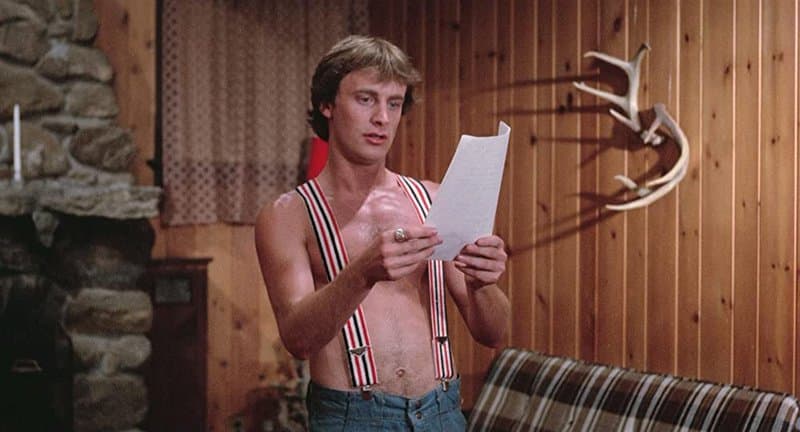
Does it land for you at all that the main character in this film is a writer?
Yes. It hits me in a way that is very uncomfortable. Especially because it shows even in isolation, you’re not safe.
Right. And when they destroy, or try to destroy, her book…?
Oh, my God. It like physically hurts. And I’ve told people that before, [and they respond], ‘That’s the thing that bothers you about this?!’ And I’m like, ‘Well, yeah. I’ve been through the other thing, and I turned out okay. I don’t know how I would react if someone destroyed my manuscript…’ [Laughs]
Exactly! Back in the day, like if you ripped up a hard copy of somebody’s book? That was it. Did there come a time when, upon reflection, you could see why this film was problematic? If not for yourself, maybe for other people?
We did an icebreaker activity in a college film class and the topic was ‘What five movies have had the greatest impact on your life?’ And I included I Spit on Your Grave, and the second the words left my mouth, the color drained from my film teacher and she said, ‘Huh, not a choice that I hear very often, if at all. I’m really interested in hearing what you have to say about this, but I don’t think this is a conversation for the class.’
She was also a survivor and she finds everything in the rape revenge and sexploitation subgenres incredibly triggering, as well as personally offensive. But the difficult conversation that we have to have with these films is: holding the two truths at the same time. My response to this film is no more correct or incorrect than her response to the film. We’re both entitled to have those feelings because unfortunately, it is impossible for people to not bring their lived experiences with them when watching a movie.
Fortunately, we were able to [find the] common ground of, ‘We’re never going to agree on this, but both of our perspectives on this are important…’ It was really hard to watch her talk about it, and it was the first time that I really recognized how deeply painful these movies can be for other people. I didn’t know anybody else who had seen this movie other than grown adults on the internet who were super into horror. So, of course they’re either going to agree with me for the right reasons, or agree with me for really fucked up reasons.
You bring up something interesting, which is being triggered by something versus being offended by something. I don’t want to presume for you, so I’ll just speak for me – for me, the film is absolutely triggering, even though I’m not female-identifying, I’m certainly under the umbrella of, you know, ‘survivor of sexual assault.’ It’s triggering, but it doesn’t offend me. And it sounds like your professor was triggered and offended. What do you say, as a person who is not those two things, to someone who is those two things?
The only thing that I can say is that I see you, I hear you, and our responses don’t invalidate one another. Trauma is not the event. Trauma is the response to that event. So in this instance, what we’re talking about with I Spit on Your Grave are different trauma responses and neither one of us are wrong.
You said something else in passing that I find interesting – liking something for possibly the wrong reason. I think of the movie Joker, which I actually really enjoyed. But I had many spirited discussions with friends who were worried people would like Joker for the wrong reasons, which are basically giving credence to doing something like storming the Capitol. They were right, I guess, in a way. And I wonder, we’ll both go to the mat for this film, but can we look at I Spit on Your Grave in a way that acknowledges the danger of this film? Like, with Joker, the insurrectionists are all, ‘Yes, I can, Joker!’ Is there a danger to people enjoying I Spit on Your Grave solely to watch a woman being abused?
Totally, totally. With any film, if you like something with problematic elements, you need to ask yourself, ‘Why?’ If you enjoy this film because it brings a sense of catharsis, or a sense of what you perceive as poetic justice, those are great reasons to enjoy this film. If you just like the image of women in pain, you might need to do a serious interrogation of yourself.
Like, I find it interesting that we’ll talk about abolition and dismantling prison systems and ending the death penalty, but at the same time there are people that’ll be like, ‘Oh, let’s send all rapists to an island and murder them.’ Like, what moral lines are you drawing here? How do you decide who is worthy of rehabilitation and who should have a celebrated death? These are the types of questions I think people should ask themselves when watching these movies. For me, I’m never going to track down the men who raped me and murder them with a boat propeller. The feeling I get knowing I have that capability inside me, that’s all I need. But I know it’s not for others. It’s a complicated movie in terms of what you can take away from it.
Do you feel like you’re swimming upstream on this movie?
Four or five years ago? I would say ‘Yes.’ Back in 2013 I contributed an essay to Hidden Horror 101, and I distinctly remember one of the criticisms of the book was, ‘Do we need yet another essay on I Spit on Your Grave?’ And I knew immediately that they did not read it because yeah, there are plenty of essays out there about how this is ‘one of the worst films ever made’ and whatever. But at the time, there really wasn’t anyone talking about it from the perspective that I was bringing. I remember the pushback I got when I was really championing this movie as a young 20-something. And it’s only been recently with films like MFA and Promising Young Woman, that people are really starting to have these difficult conversations and are more willing to say, ‘Yeah, I like this,’ because they know that they’re not alone.
I think it’s interesting that Promising Young Woman is sort of an unassailable film right now. You aren’t allowed to not like it because if you don’t like it, it says something about you and your relationship with women or how you view women’s empowerment, as opposed to just not liking the filmmaking. But with I Spit on Your Grave, you have to, like, dig in your heels to defend that movie. And I would guess that the difference being, first of all, some time, but also how the filmmakers treat the actress in the film. Camille Keaton is nude for a huge chunk of I Spit on Your Grave, and assaulted so many times, and I’m sure that that is one of the things people who are not fans of the film would point to as exploitative. And I’m wondering if you can speak to that and the necessity of it in the context of this film.
Saying, ‘This is my favorite presentation of this [scenario]…’ sounds really gross, but it is, because people really don’t understand how terrible that experience is. There are two things that stick out:
The first is that this movie is completely devoid of a soundtrack. You’re hearing what’s happening as it happens, and you don’t get the relief of being able to look away. This movie is willing to go, ‘No, no, no. You’re going to sit here and you’re going to see how bad it is. And you’re going to understand how bad it is…’
But more importantly, the majority of the time that we see Camille Keaton nude is the recovery process. It’s her left alone to figure out – What do I do? How do I get home? Recovering and processing? That never gets shown, ever. I’ve been left alone in a bedroom, while a party raged underneath me. And I had to figure out how to put myself back together and leave. This movie [shows it] in a way that I honestly think is so respectful of what we go through.
I actually didn’t realize there was no soundtrack when I watched it. It becomes sort of a test for you as a viewer because there’s no music to tell you how to feel. Whatever comes up is your undiluted reaction to what’s being portrayed on screen.
Something else I didn’t realize until I did my research for our conversation is that I Spit on Your Grave came out of writer/director Meir Zarchi’s real-life experience of finding a young woman who’d been attacked in the park and trying to help her. Finding that out sort of poked holes in my ‘movie made through the male gaze’ questions. I’m wondering if you could speak to the male gaze issue, and maybe in the context of this film and Promising Young Woman, which was made by a woman. Are there appreciable differences between the two? Things that are handled better in one than the other?
The first time that I learned about Meir Zarchi’s experience and what inspired him to make this movie, it brought me to tears. Meir is, to my knowledge, the only person who’s made a film in this world of exploitation rape revenge who genuinely and absolutely was like, ‘This is a real thing that happened to me. And it made me so angry that I had to do something about it…’
Do I have mixed feelings about sequels and remakes and things that have come after this? Yes, because now we are trying to profit off rape culture and that feels gross to me. But in terms of this original existing piece in a vacuum, it doesn’t bother me knowing that this is coming from a male director. The only real male gaze-y moments are from the perspective of [the character] Johnny [Eron Tabor] and the crew, and it’s supposed to make us feel a little icky, because if you find those scenes titillating, then you’re just like them.
When I look at Promising Young Woman, which has a woman director, I personally really loved the film but I know plenty of women, including survivors, who absolutely hate it. But ultimately I Spit on Your Grave is a rape revenge movie, and Promising Young Woman is a vengeance movie, and those movies play by different rules. But we are so used to a woman [character] having a rape revenge storyline, I think a lot of people don’t know how to process a movie when it stops playing by those rules. They want it to be I Spit on Your Grave. They want her to take all of these men down and kill them, but that’s not what story we’re getting, and it never intended to be.
If you had your druthers what would be different about I Spit on Your Grave?
I’ve always had difficult feelings about the character of Matthew [Richard Pace] and how he’s presented just as much of a villain as the rest of the crew. In reality, Matthew is being manipulated. I wish that the treatment of that character was presented in a way that makes it more obvious that he’s not fully understanding the severity of what he is participating in.
There’s a bit of a comic tone to some of it, especially when he finally assaults her, just the way the actor is playing the role, the way it’s directed. It just feels, like, verging on being played for comedy. And there’s that sort of weird, moral gray area where he’s done this thing and it’s terrible, and he certainly deserves, you know, the revenge part of the rape revenge. But, I don’t know, it feels like there’s not informed consent on both sides of that in some way. Which, I acknowledge comes dangerously close to giving this dude a pass…
This is my ‘bad feminist, bad rape survivor’ perspective – the ‘rape is rape’ slogan has destroyed the rape culture conversation. No one wants to talk about how Matthew’s situation is different than Johnny because conversations like that are messy and without complete answers. It’s an endless discussion that people aren’t having, because if you try to, it gets turned into, ‘You’re a rape apologist.’ I’m not a rape apologist, I just understand that somebody who is neurodivergent, who’s being greatly pressured by people who are emotionally abusing him throughout an entire movie, is in a different situation than somebody who’s actively malicious.
Right? Yes. I totally agree. This is one of the reasons I’m having these conversations, because I feel like every chance that we get to introduce nuance into any conversation is important.
There’s this very ugly trend of speaking on behalf of communities, and when it comes to movies like I Spit on Your Grave or even Promising Young Woman, there tends to be a lot of ‘This movie is bad for survivors,’ ‘This movie is bad for rape culture,’ or, ‘As a survivor, I think this…’ definitive statements, and I really wish people would get used to saying, ‘This did not work for me…’ or, ‘This does not speak to my experience…’ Because when people say these things like, ‘I Spit on Your Grave is bad for survivors…’ speak for yourself. Finding the film is one of the most life-changing things that I’ve ever experienced.
I think a lot of stuff we love has an expiration date. And we’re finding out now that for some of the stuff that has an expiration date, the will of the people is that it be put into a vault and only taken out for very special occasions, like a film class, if that. And I think some people would look at I Spit on Your Grave as absolutely having an expiration date. I wonder if you could speak to the people who feel like this movie should go away completely? And also, in what context do you feel this movie should be consumed today?
It sounds overdramatic but this film saved my life. I feel this movie – I don’t think this needs to be in a vault. I think it’s a movie that needs to be accessible, but I don’t think it’s necessarily a movie that we should be promoting on the front page of Shudder or something. Fortunately, we have the Internet where people can look this up. And I think just like how old cartoons have bumpers saying, ‘Hey, this cartoon is a product of its time, but we’re not gonna hide it in a vault because that’s the same as pretending that this didn’t exist’ – maybe some form of nuanced content advisory could be added. Since it’s been remade and there’s the sequels and whatnot, people are going to eventually find it. And I think that notice is necessary because that’s just where we’ve evolved as a culture.
I do have mixed feelings about teaching it in a film studies course, because again, we don’t know what people have gone through. And I think subjecting people to this film in a mandatory sense is a little unfair. I think this is a movie that you need to find; it’s not a movie that needs to be demanded of you.
So in summation, why is this film defendable and why is it important that we still have access to it?
I Spit on Your Grave is one of the most brutally honest portrayals of the horrors of rape and sexual assault, and was [the one film] willing to talk about how horrific and terrible sexual assault was long before we were having conversations with the #MeToo movement. And I feel the fact that the response to this movie was to shut it down, ban it, and pretend that it was unworthy of mention, says a lot about our culture in that the [most realistic] portrayal of rape is the one that we have decided is the one that needs to go away. And on [those] terms alone, this movie is so important and in need of defending.
I don’t think that this is a movie that is going to work for everybody, but just because it doesn’t work for one person does not mean that this film is now devoid of value. That’s the beauty of movies. They don’t work for everybody. But if they work for you, then that makes them important.



